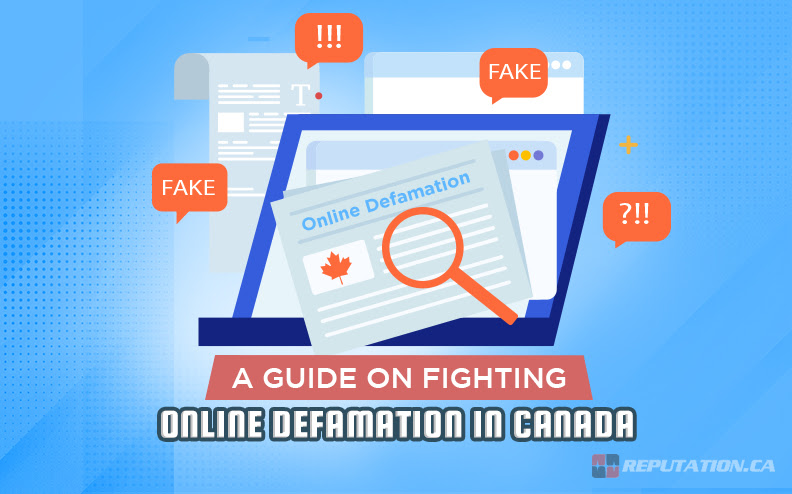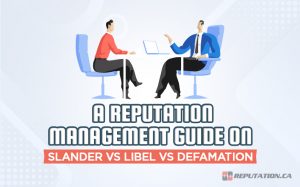Because online gossip moves faster, it can affect your real life before you even know it. One harsh review or a single nasty post might drive away clients or cost you a job opportunity, all because someone said something that’s not true. That feels sudden and personal. If a false statement about you appears in Canada, you have a few easy ways to set things right.
First, think about whether a firm, yet polite letter could solve the problem. A short reminder that asks the writer to remove the post tends to resolve the issue within a couple of days. If the poster ignores you, contact the website and ask the moderators to take down the harmful words. Canadian laws give you real backing, though strict time limits apply, so please move soon.
While you work on that, you should keep a log of every false claim you see. Write down the date and grab a screenshot. You should also copy the link and record any replies. That basic habit gives context for the moderators and gives you a better view of how the claims develop.
Let’s go over each step together so you can respond with steady confidence.
How The Law Frames Online Defamation Claims
Courts in Canada see an online post the same way they treat a line in a printed newspaper, so your words count as published the second even one other person sees them. That view shapes your plan from the start because it identifies the exact point when your reputation falls under legal protection and gives you a specific starting point for any case you might think about bringing.
You can usually go ahead and sue in any province where people actually read the statement, and in most cases, that means your home province if that’s where you and your friends came across the post. When you file close to home, it makes the process easier, and skipping that step can put your claim at risk, so do a quick check before you send anything to the court. When judges decide whether to take on the dispute, they look first at where the writer or speaker lives, then at where you suffered harm to your reputation. A defendant may push for a different province if you say it would be more convenient for them, so be ready to show why your chosen courtroom makes more sense for everyone involved. That’s also the case for grabbing evidence.
Most provinces use common law principles for defamation, while Québec goes its own way with civil law. If you end up in Québec, you need to show that the other person messed up, that you suffered real harm, and how the mistake actually caused that harm.

Deadlines move fast. In Ontario, you usually have to send a formal message a few weeks after you find the post. If you miss the deadline, you lose the chance to bring the claim, so set a reminder the minute you think something looks defamatory.
Online cases add extra complications because not everyone agrees whether a platform like Facebook or Google acts as a publisher or just a neutral bulletin board. Courts continue to revisit that point, and their answers change year to year, usually changing who you target for damages and how far your claim might reach.
Take the Toronto shop owner who spent three long years fighting a batch of fake reviews that showed up on different sites. He finally won money based on how far the lies traveled and how much they hurt sales. The entire process was expensive. But it proved that patience and strong evidence can still pay off.
Try to back up those files in more than one place, too, just to be safe.
Why Your Proof Collection Builds The Case
Courts only move when they can see obvious proof, so collecting each bit of online content as early as possible gives you a real edge in a defamation fight. Screenshots that show the full page, the URL, and the date set you up on strong ground and even let a judge trace every word back to its source.
The web changes every minute. One second a post is blasting your name, and the next it might vanish because the writer gets scared or the site does a scheduled cleanup. Grab a copy the instant you see it. Hit that screenshot shortcut, copy the link, and stash this in a safe folder before something changes.
Lost posts leave missing content you can’t recover later. Websites wipe user uploads the second a complaint lands, and this quick purge can leave you scrambling. When you store your own records early, you protect yourself from those surprise deletions and your timeline.

If a page has already disappeared, tools like the Wayback Machine can retrieve an older snapshot. They work in most situations and cost you nothing. Your laptop’s built-in screenshot feature works fine, too, so there’s no need for expensive software.
Never change the files you save. Even cropping a border or fixing spelling can raise eyebrows and let the other side claim the evidence is fake. Leave every pixel as it was when you found it.
After each round of saving, pause and ask if a stranger could follow the story from start to finish. Get together a few more examples or check with an attorney to see what else would help.
With an organized bundle of unedited proof in hand, you can then contact the poster or their platform from a position of strength. That extra confidence pushes them to remove the content or settle the dispute faster.
When Should You Send a Cease Or Desist Letter
Send a cease and desist letter when you want a faster, cheaper fix than dragging someone to court. Because the document calls out the bad behavior in plain terms, people stop when they see it. You usually shut down the false chatter in days instead of months and save a big chunk of legal fees along the way.
Have a lawyer draft the letter so the other side knows you mean business. That professional letterhead, the official tone, and the lawyer’s signature usually cue the reader that real consequences could follow if they ignore you. Most people understand the fight isn’t worth it and take down the post or comment without any more pushback. A direct legal document also establishes the boundaries. That precise communication gives you stronger ground to stand on while the offending words remain and tells them you’ll press forward if they don’t remove them.
Look at what happened to Mira, who runs a small coffee shop in Toronto. After a customer claimed online that her sandwich caused food poisoning, sales dipped practically overnight. Mira’s lawyer fired off a short cease and desist to the reviewer and Yelp. Two days later, the post vanished, and her regulars started to come back. No lawsuit, no long wait, just one well-targeted letter.

Maybe you weigh the cost before you move ahead. Most lawyers charge between five hundred and fifteen hundred dollars to write a helpful cease and desist, depending on how tangled the facts are. That fee may sound expensive up front. But full-blown litigation can swallow ten times that amount very fast.
Time your move well. Send the letter too late, and the rumor may already have spread. Push it out too early or in an overly harsh tone, and you might end up making a small issue worse. Try to use firm language that states what you want, while staying professional enough to avoid needless hostility.
Weigh the other party’s mindset, too. A bored troll may relish the drama and post your letter on social media for laughs. Still, someone who acted impulsively may back down the minute they see legal phrasing. Judge the personality, then pick a matching strategy.
Stay honest in every claim that you make. If you toss out wild accusations you can’t prove, you could end up on the hook for defamation in return. Use only statements you can back up with concrete evidence and present them calmly and factually. Finally, use the platform’s own reporting tools at the same time. Sites like Yelp, Facebook, and Google Reviews usually give you buttons to flag false content. File those reports while your lawyer sends the letter. Together, the two methods raise the odds that the harmful post will disappear quickly and stay gone.
What The Platforms Can Remove By Policy?
Different social networks usually manage defamation complaints in their own ways, and it’ll shape how fast you get help. On Facebook and Instagram, you usually see them jump on harassment or hate speech first, while words that hurt someone’s reputation sit further back in the line. Because their report menus don’t list defamation, it speeds up the review to point this out.
When you paste the sentence, add a quick line that shows why it’s wrong and drop in a screenshot or two. Moderators understand your point immediately – this strategy also stops the rumor from spreading while they review your report.
So when you fill out the form, resist the urge to say only that the post is fake. Just point out the line that misstates the facts, then add a short note of this kind – “Invoice attached shows we never serviced this address on that date.” Every platform leans toward action when the claim is obviously false.

Response times can vary quite a bit. Facebook usually hits you back within a couple of days, while Google can take weeks. Keep a calendar or reminder list so you can remind them the second a deadline passes. On Reddit, mods can pull a thread the same afternoon as long as you show rule-breaking.
When you follow up politely but promptly, you get your request on their radar. Check the status page and send the necessary form if they ask for it. Then reply to any bot email they send. Why let a stalled ticket sit when a quick note can push it forward? Skip a step, and the post may remain visible longer than you expect. I’ve seen persistence work many times. A neighborhood plumber filed three separate reports before TikTok finally yanked a clip claiming he stole tools from a client’s garage – his third try included time-stamped GPS logs that proved he was across town, and this extra proof ended up working.
Think the first “no” is the final word? Usually it’s not. Most networks give you an appeal button, and this second look can flip the choice if you add stronger proof or more concise wording. People lose out because they never explain how the post crosses from opinion into fact. When you appeal, attach anything concrete you have available. Putting real documents on the table gives moderators cover to act and can lead them to reverse the call. Platform removal is only one part of your cleanup plan. Even after a tweet or video disappears, the rumor may already be sitting in someone’s screenshots. You might still want to post a calm clarification, ask loyal customers for real, latest reviews, or directly talk to local media to rebuild trust. Finally, manage your expectations when the claim sits in a policy gray zone. A review that has a mix of harsh opinion with a few shaky facts probably won’t break any written rule, so the site could leave it up.
In cases like that, you have more luck pushing positive content forward than chasing a takedown that never comes.
Monitor and Manage Your Reputation
Bad posts spread fast online, so you could even feel overwhelmed when your name shows up in a negative story. When you have some helpful information and a few reliable tools at your side, the whole job feels manageable. Once you’re aware of the legal matters, gather strong proof and pick the right time for a cease and desist letter – you set up a process that usually prevents harmful content before it sticks. Work through each step with steady patience, and you’ll see the pressure start to ease off.
A plan guides you through every legal step and, as you might expect, your stress levels drop. Careful evidence collecting usually gives you the strong foundation that you need, so you can proceed with a bit more confidence whenever problems come up.
Plenty of people have already repaired their reputations by sending firm answers at the time when a false claim showed up. Courts are there to protect you, though mediation or direct negotiation might give you quicker wins. Take screenshots, save full-page archives, and jot down dates and times, because that extra record-keeping lets you move forward without second-guessing yourself. Have every file ready while you work.
Mediation and similar routes usually resolve matters a lot faster, which creates less tension. When you act with determination, you protect your reputation and breathe a little easier while the matter gets resolved.

Each case carries its own twist. But the general pattern stays nearly the same. Stay calm, move step by step, and don’t try to respond impulsively. Your reputation stands on years of effort and personal integrity – it deserves careful protection. Most Canadians have already used this to get through hard situations, and you can probably do the same.
If you want experienced hands to guide the process, help is right there. Do you feel ready to improve your online image? Try Canada’s top team for reviews, social media, public relations, and crisis response. If you’re a victim of cancel culture or just trying to build a stronger presence, we’ll support you.
Reach out to us at Reputation.ca today and get help from the nation’s leading reputation management team!







